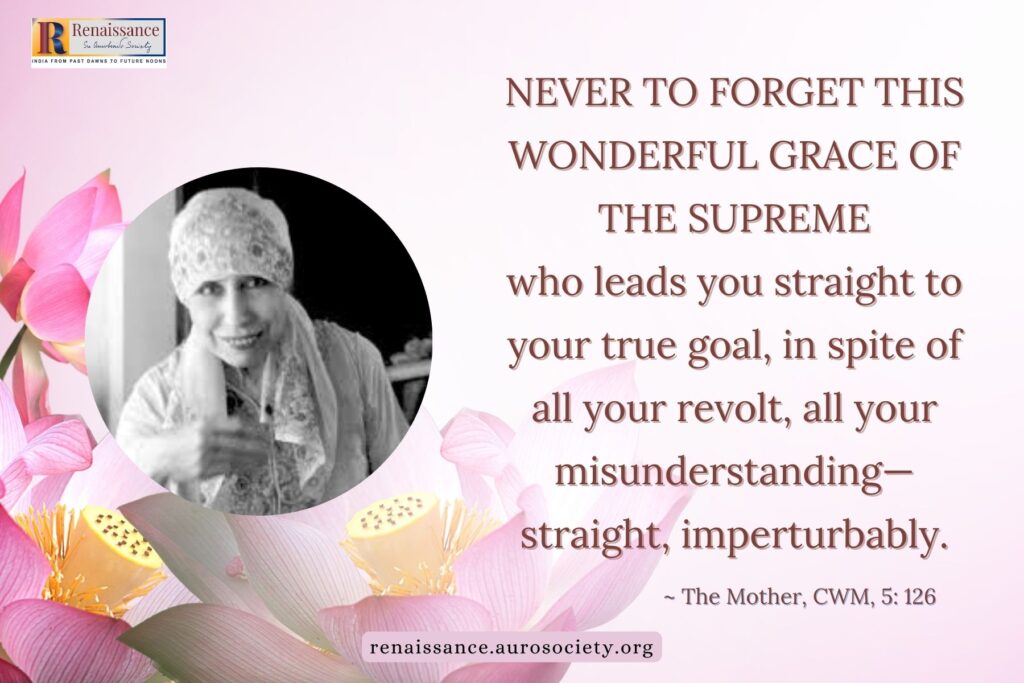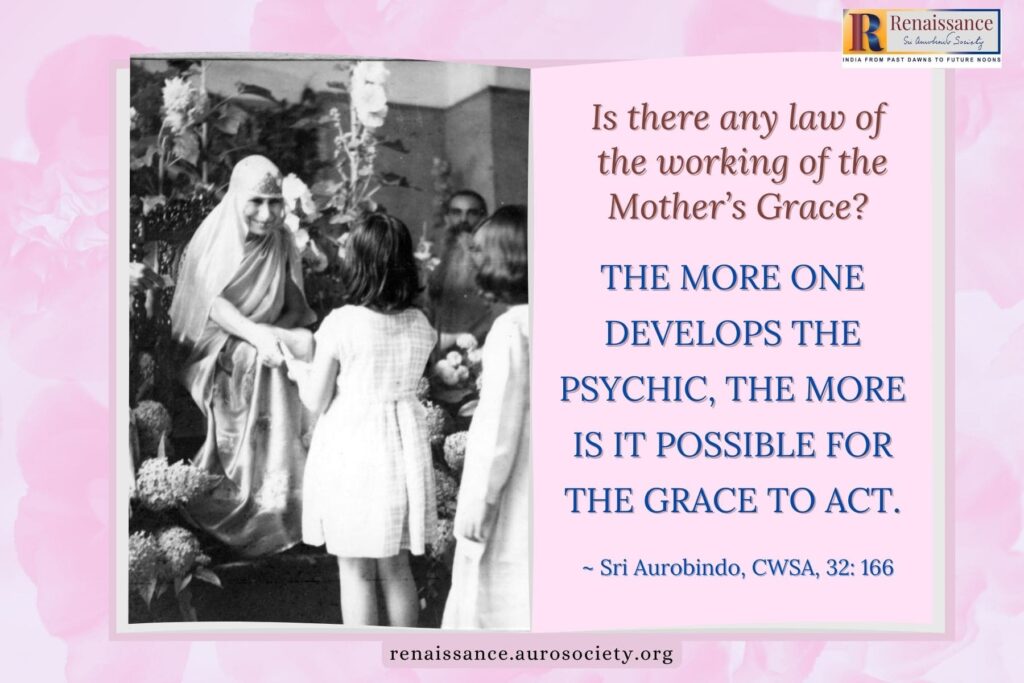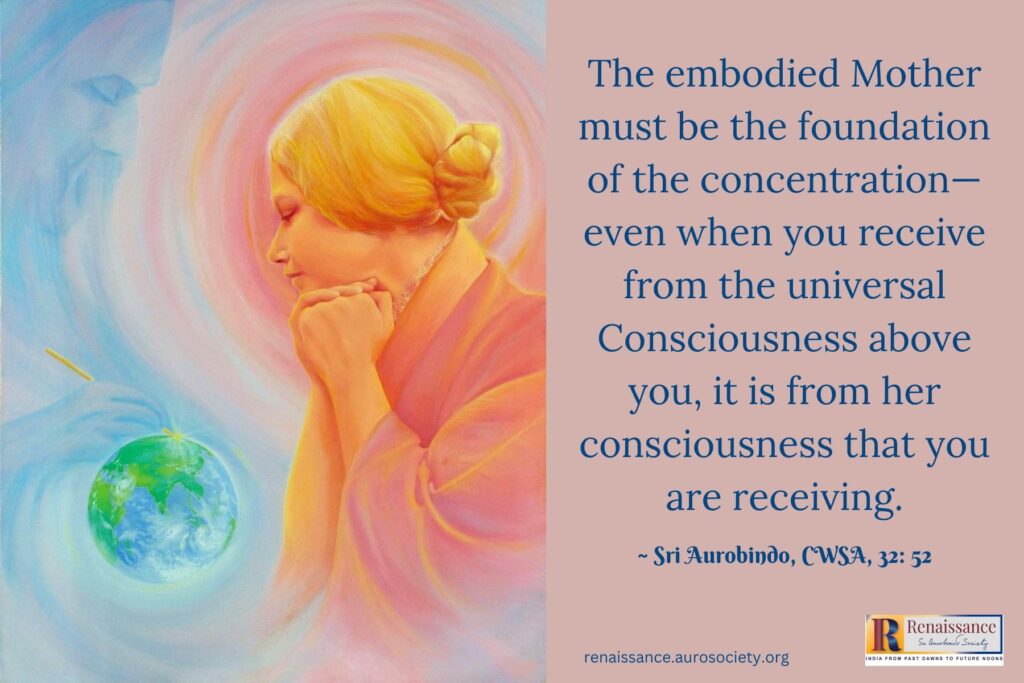Editor’s note: For the Sunlit Path feature, we present a few key selections from the Mother’s words. These words focus on a few salient aspects of work when done as yoga. The selection on Work and Surrender is especially relevant for all aspiring to grow inwardly through yoga of works.

Work as Sadhana
Consciousness develops best through work done as an offering to the Divine.
Indolence and inaction end in tamas: that is a fall into unconsciousness; it is contrary to all progress and light.
To overcome one’s ego, to live only in the service of the Divine—that is the ideal and the shortest way towards acquiring the true consciousness.
* * *
You must do the work as an offering to the Divine and take it as part of your Sadhana. In that spirit the nature of the work is of little importance and you can do any work without losing the contact with the inner presence.
* * *
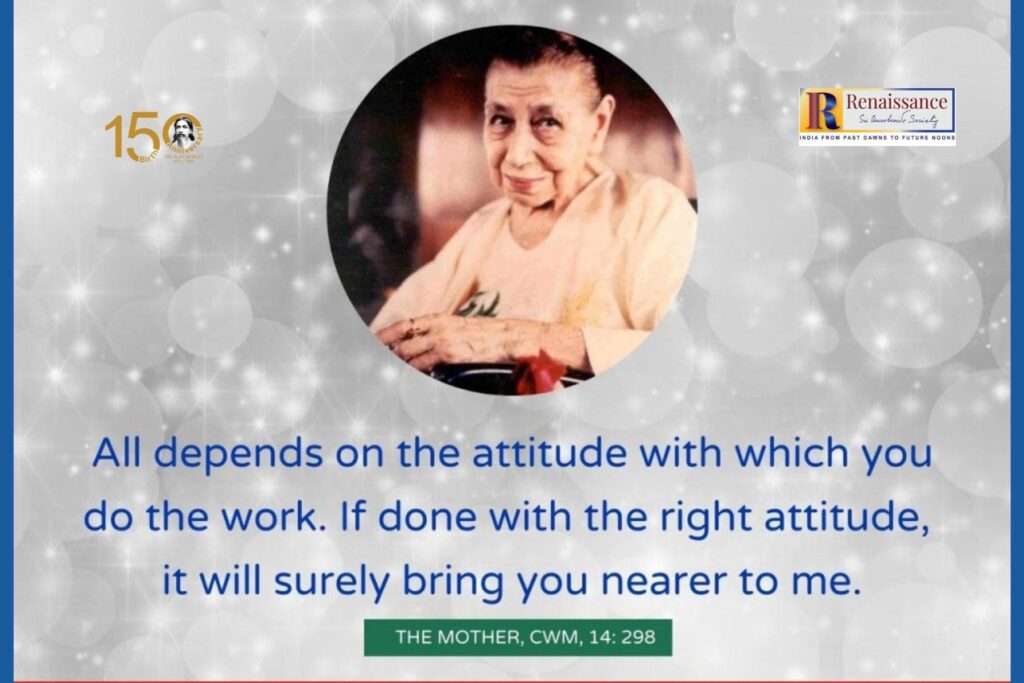
* * *
I make no difference between work and yoga. Work itself is yoga if it is done in a spirit of dedication and surrender.
* * *
Let us work as we pray, for indeed work is the body’s best prayer to the Divine.
* * *
The progress in sadhana comes from the rectification of the inner and outer attitude, not from the nature of the work one does—any work, even the most humble, can lead to the Divine if it is done with the right attitude. [. . .]
* * *
How can I offer my work?
Usually one works for one’s own profit and satisfaction; instead of that, one should work to serve the Divine and express His will.
* * *
Whatever is our work and whatever we do, we must do it sincerely, honestly, scrupulously, not in view of any personal profit, but as an offering to the Divine, with an entire consecration of our being. If this attitude is sincerely kept in all circumstances, whenever we need to learn something to do the work more effectively, the occasion to acquire this knowledge comes to us and we have only to take advantage of the opportunity. [. . .]

Progress and Perfection in Work
You will become more and more perfect in your work as the consciousness grows, increases, widens and is enlightened.
* * *
In all action, all work done, the degree of perfection depends upon the degree of consciousness.
* * *
Disciple: To work in the Divine’s way is not easy for a blind and egoistic person like me. By that I mean: to work unegoistically and to keep myself open to your force so that it may work unhampered in me. Am I right?
Yes, it is correct.
Disciple: Judging by that standard I have no right to work for you at all; but it is also not desirable, perhaps, to cease to work for you.
Certainly you must not stop working for me. It is by working that the perfection of the working comes.
* * *
Try to enjoy doing everything you do.
When you are interested in what you do, you enjoy doing it.
To be interested in what you do, you must try to do it better and better.
In progress lies true joy. [. . .]
* * *
Perfection in the work must be the aim, but it is only by a very patient effort that this can be obtained.
* * *
Open yourself more and more to the Divine’s force and your work will progress steadily towards perfection.
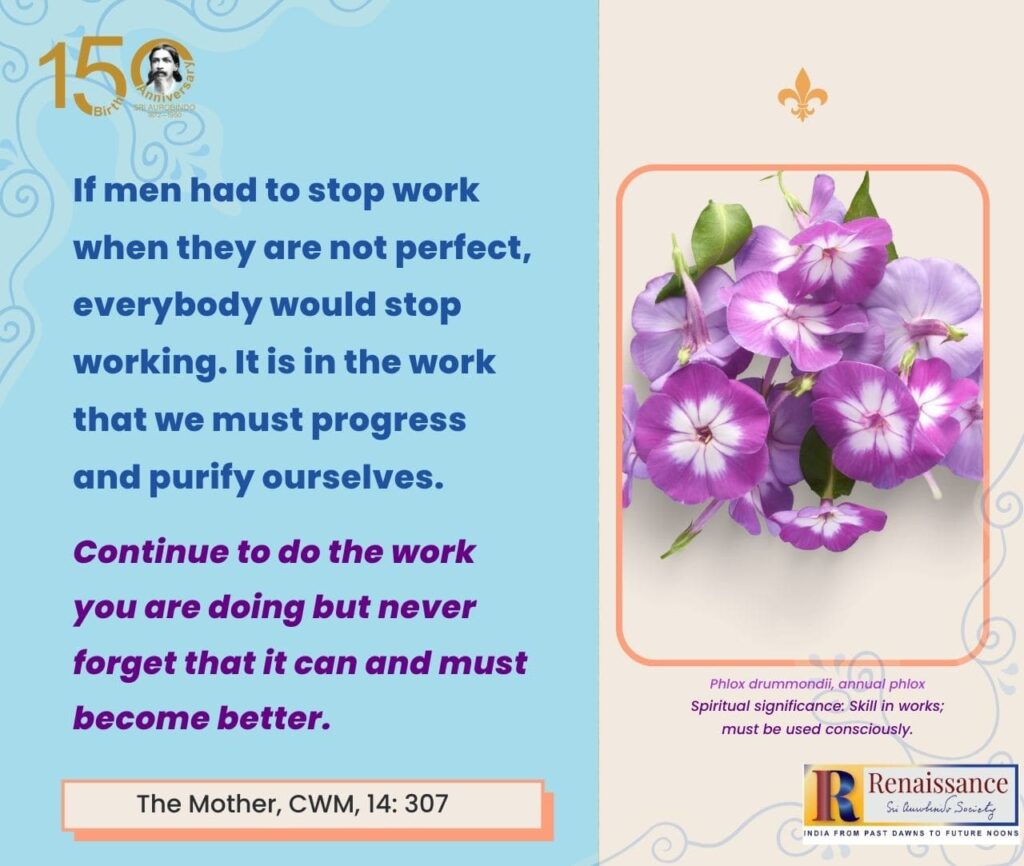
* * *
Let nothing short of perfection be your ideal in work and you are sure to become a true instrument of the Divine.
* * *
There must be order and harmony in work. Even what is apparently the most insignificant thing must be done with perfect perfection, with a sense of cleanliness, beauty, harmony and order. [. . .]
Nothing is too small to be neglected, the same care meets all circumstances.
* * *
To undo one thing in order to build another is not a good policy. Those who are consecrated and want to work for the Divine must be patient and know how to wait for things to be done at the right moment and in the right way.
* * *
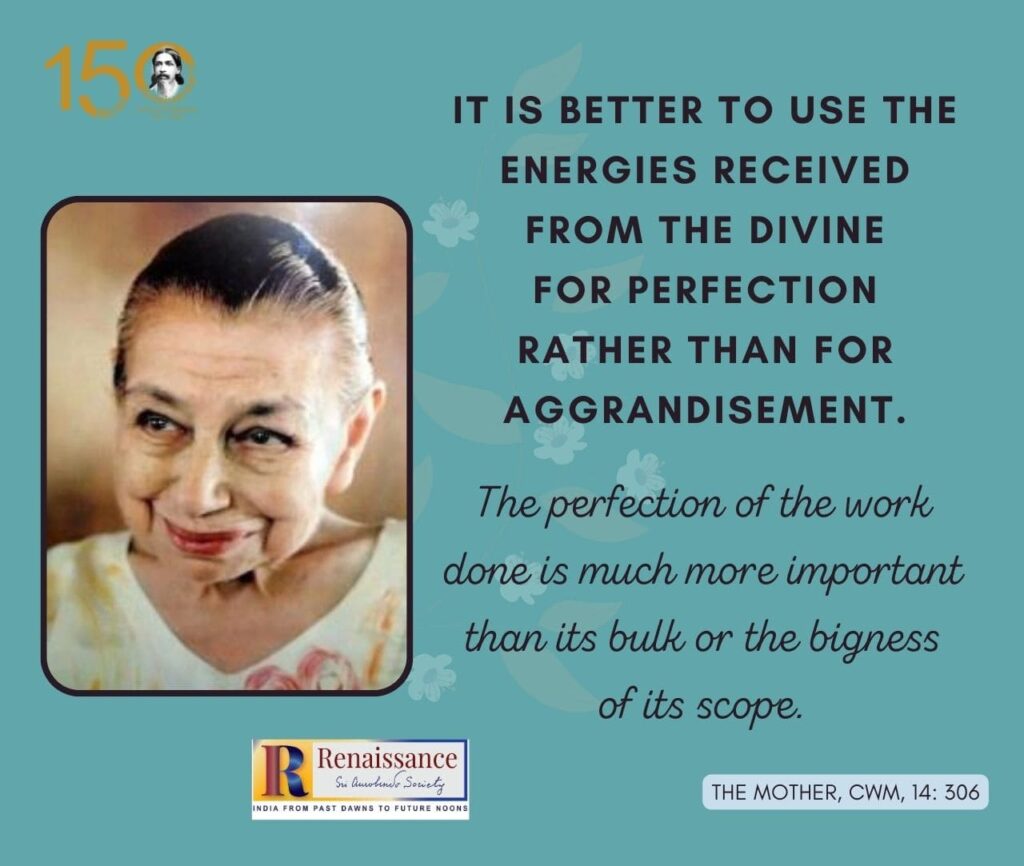
* * *
When one works for the Divine, it is much better to do perfectly what one does than to aim at a very big work.
* * *
To begin a work and to leave it half done and to start another work elsewhere, is not a very wholesome habit. [. . .]
* * *
To do the work that one does with all sincerity, as perfectly as one can, is certainly one of the best ways to serve the Divine.
Work and Surrender
Disciple: Does not surrender consist in offering one’s work like a good servant?
The Mother: Work is a good discipline. But it is not this idea, it is not the idea of a passive, unconscious and almost involuntary submission. It is not that. It does not lie only in work.
The most important surrender is the surrender of your character, your way of being, so that it may change. If you do not surrender your very own nature, never will this nature change. It is this that is most important.
You have certain ways of understanding, certain ways of reacting, certain ways of feeling, almost certain ways of progressing, and above all, a special way of looking at life and expecting from it certain things—well, it is this you must surrender. That is, if you truly want to receive the divine Light and transform yourself, it is your whole way of being you must offer—offer by opening it, making it as receptive as possible so that the divine Consciousness which sees how you ought to be, may act directly and change all these movements into movements more true, more in keeping with your real truth. This is infinitely more important than surrendering what one does.
It is not what one does (what one does is very important, that’s evident) that is the most important thing but what one is.
Whatever the activity, it is not quite the way of doing it but the state of consciousness in which it is done that is important. You may work, do disinterested work without any idea of personal profit, work for the joy of working, but if you are not at the same time ready to leave this work, to change the work or change the way of working, if you cling to your own way of working, your surrender is not complete.
You must come to a point when everything is done because you feel within, very clearly, in a more and more imperious way, that it is this which must be done and in this particular way, and that you do it only because of that. You do not do it because of any habit, attachment or preference, nor even any conception, even a preference for the idea that it is the best thing to do—else your surrender is not total.
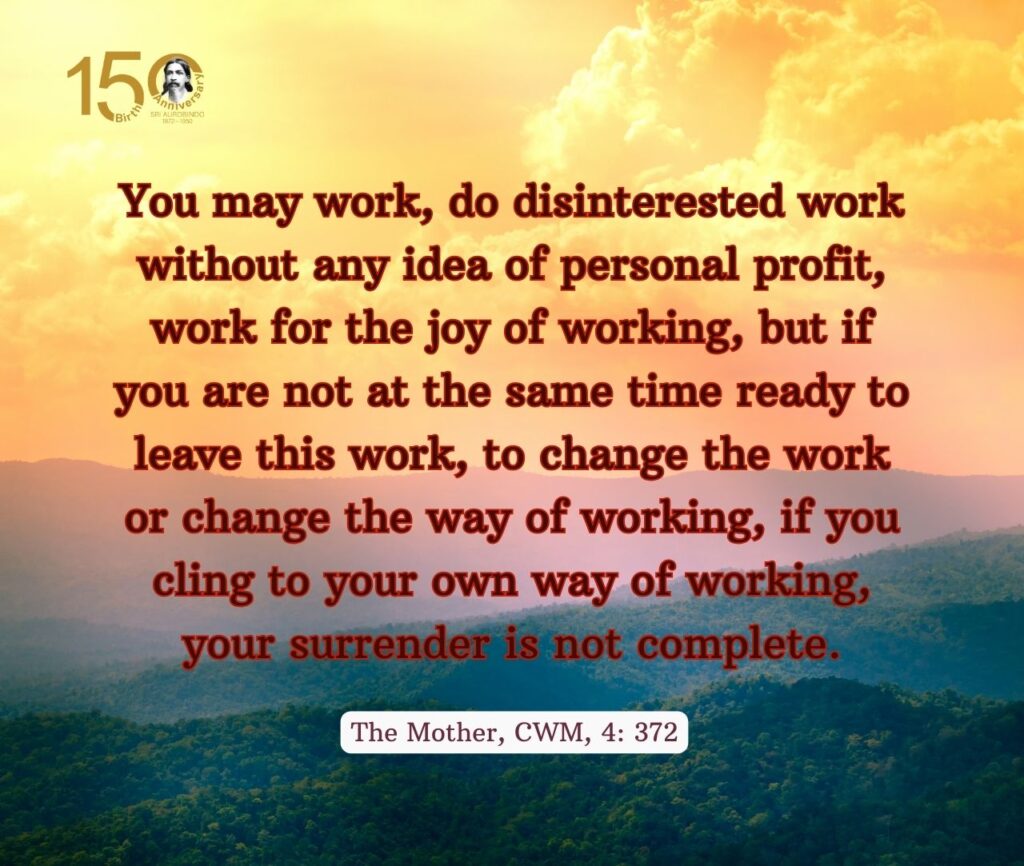
As long as you cling to something, as long as there is something in you which says, “This may change, that may change, but that, that will not change”, as long as you say about anything at all, “That will not change” (not that it refuses to change, but because you can’t think of its changing), your surrender is not complete.
It goes without saying that if in your action, your work, you have in the least this feeling, “I am doing it because I have been told to do it”, and there is not a total adherence of the being, and you do not do the work because you feel it must be done and you love doing it; if something holds back, stands apart, separate, “I was told it had to be done like that so I did it like that”, it means there is a great gulf between you and surrender.
True surrender is to feel that one wants, one has, this complete inner adherence: you cannot do but that, that which you have been given to do, and what you have not been given to do you cannot do.
But at another moment the work may change; at any moment it may be something else, if it is decided that it be something else. It is there that plasticity comes in. That makes a very great difference.
It is well understood that those who work are told, “Yes, work, that is your way of surrendering”, but it is a beginning. This way has to be progressive. It is only a beginning, do you understand?
Collaboration and Harmony in Work
. . . It is in the attitude in the work, especially in the relation with the other workers, that the change must take place. Each one sees the work in his own way and believes it is the only true way, the only way that expresses the Divine Will. But none of these ways is completely true; it is only by rising above these divided conceptions that one can reach a better understanding of the Divine’s Will. This means mutual understanding and collaboration instead of opposition and clash of wills and feelings.
* * *
For harmony and better work, it is not by changing men that things can get better, but by changing one’s own consciousness and character.
* * *
As a general rule it is better not to intervene in things that do not fall within one’s own work.
* * *
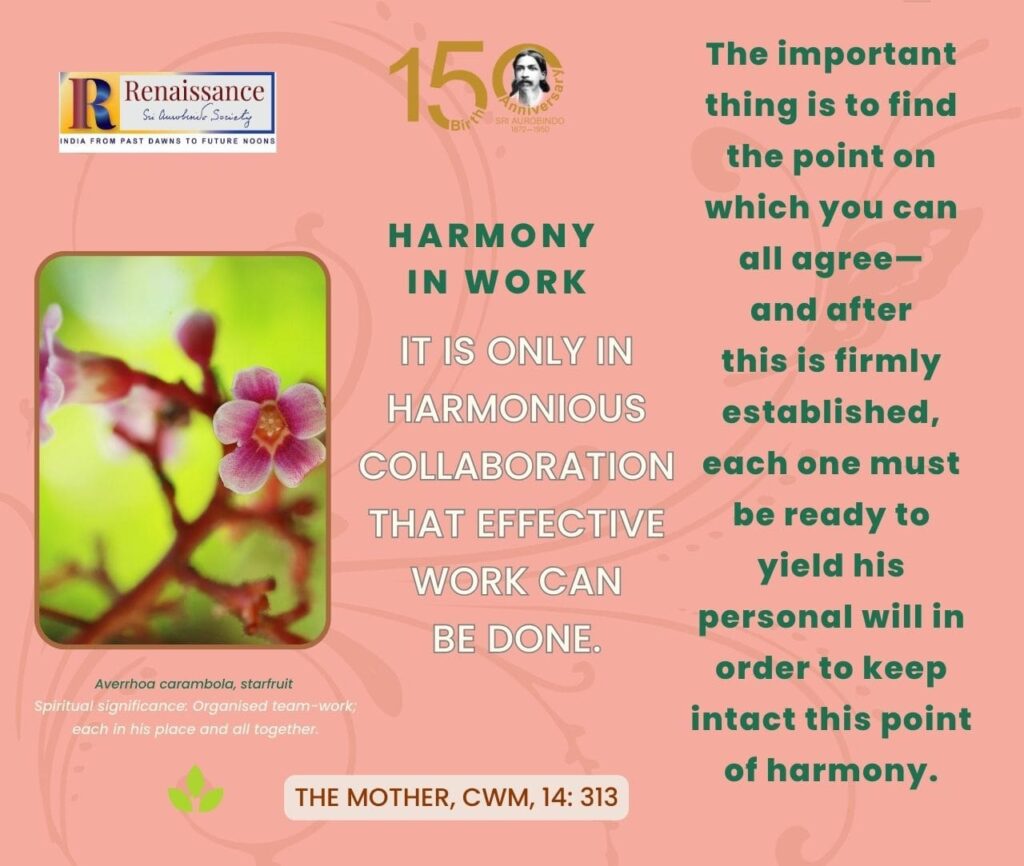
If in the work you meet with some difficulties, look sincerely into yourself and there you will discover their origin.
* * *
The difficulties in work come not from circumstances or petty outer occurrences, they come from something which is wrong in the inner attitude, especially in the vital attitude: egoism, ambition, fixity of mental conceptions regarding work, vanity, etc. And it is always good, in order to correct the disharmony, to look for the cause in oneself rather than in others.
* * *
To recognise the presence of a “disharmonious atmosphere” is useful only so far as it wakes in each one the will to change it into a harmonious atmosphere and to do that the first important step is for each one to get out of his own limited point of view in order to understand the point of view of others. It is more important for each one to find the mistake in himself than to insist on the mistake of others.
I add that all those to whom I have given responsibility in the work are expected to be faithful to this responsibility and, without allowing of any “hurt feeling” to creep in, do their best to carry on successfully their duty. [. . .]
* * *
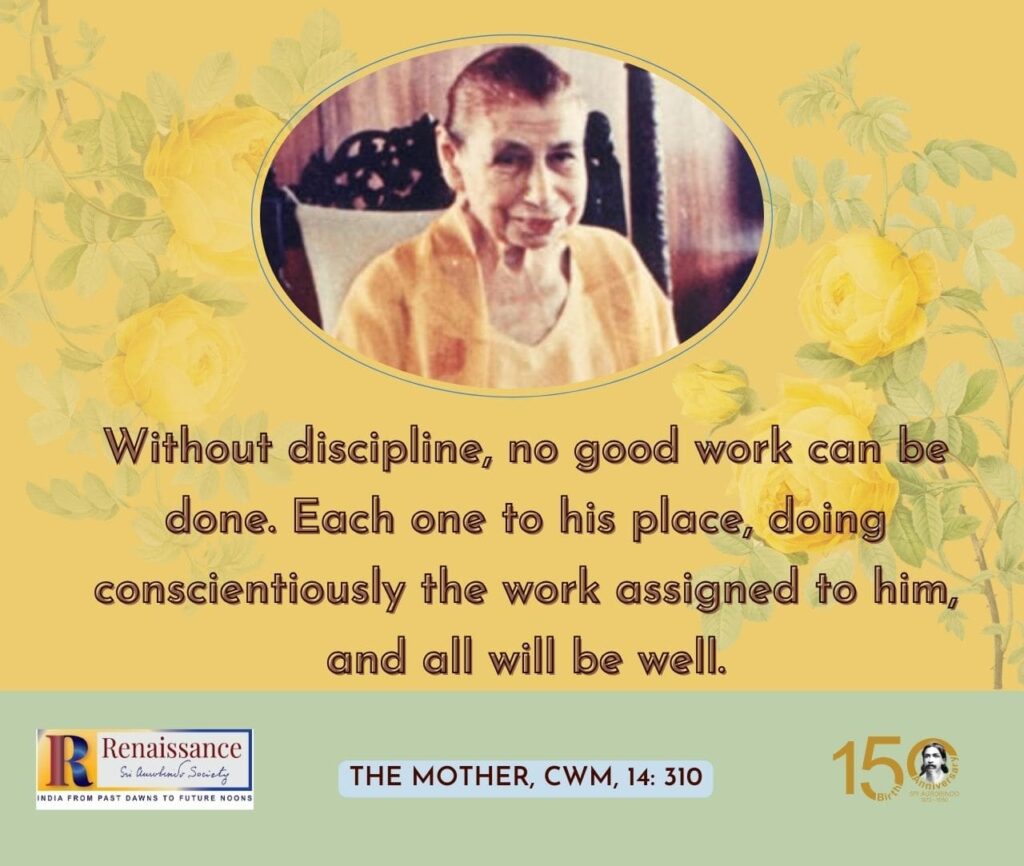
When one has work to do for a community, to take a decision for personal motives and to abandon one’s work is a serious mistake.
You mention faults committed which cannot be corrected: this is wrong. Any fault can be corrected if you sincerely set to work to correct yourself. To run away from the progress to be made is an act of cowardice and I cannot approve of it.
First of all make a sincere and complete confession of faults committed. Afterwards I shall see what is to be done.
* * *
Collaboration and reciprocal goodwill are indispensable for good work. [. . .]
* * *
It is only in harmonious collaboration that effective work can be done.
The important thing is to find the point on which you can all agree—and after this is firmly established, each one must be ready to yield his personal will in order to keep intact this point of harmony.
* * *
When we have to work collectively, it is always better to insist, in our thoughts, feelings and actions, on the points of agreement rather than on the points of divergence.
We must give importance to the things that unite and ignore, as much as possible, those that separate.
Even when physically the lines of work differ, the union can remain intact and constant if we keep always in mind the essential points and principles which unite, and the Divine Goal, the Realisation which must be the one unchanging object of our aspiration and works.
* * *
If anyone were capable of seeing the welfare of the work quite independent of his preferences and without turning everything into a personal question, then most of the difficulties would be solved.
* * *
If people could stop speaking of the work as their work it would put an end to a lot of trouble. Here, all work is the Divine’s.
* * *
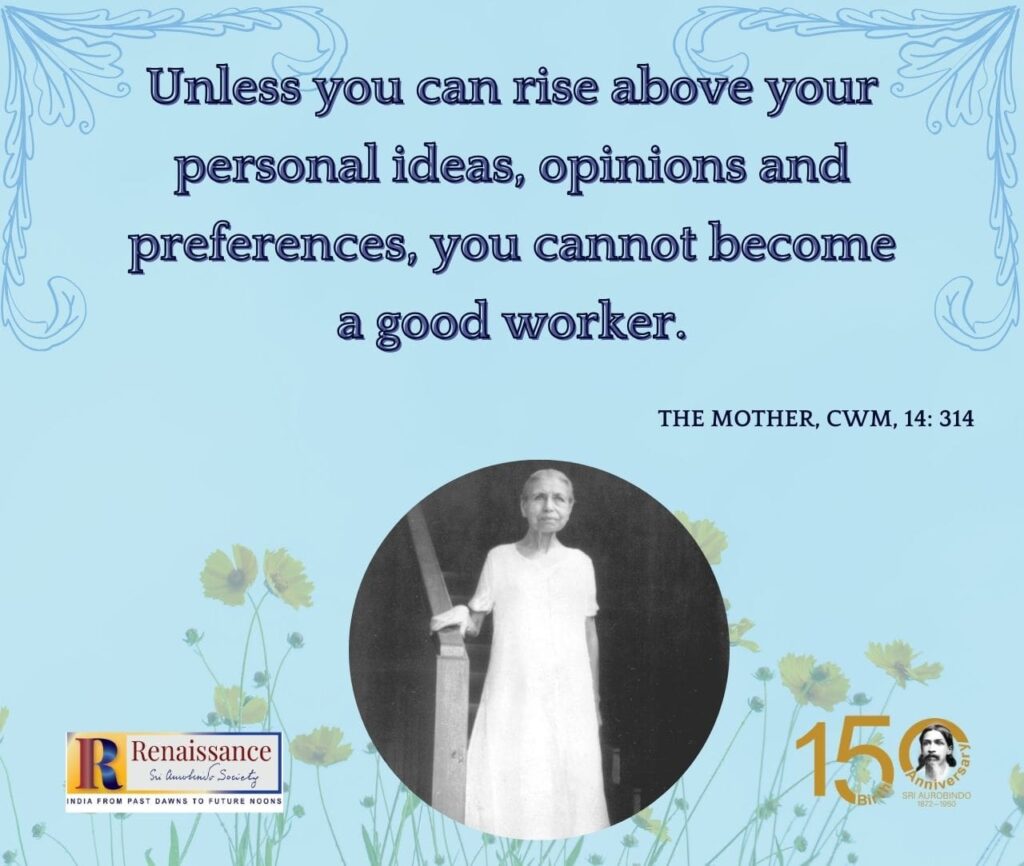
Difficulties in Work
With consecration the work can be done much more easily and happily. But nobody must be asked a greater effort than what he can do.
* * *
The best way to work without getting tired is to offer the work you do (whatever work it is) to the Divine and to find in the Divine the support you need—for the Divine’s Force is inexhaustible and He answers always to whatever offer is made to Him sincerely.
Then, when you will feel that it is the Divine’s Force that has done the work in you and through you, in your sincerity you will know that the merit is His and not yours—so there is no more reason to be proud. [. . .]
* * *
I trust you fully and know you are capable of fulfilling quite well your responsibilities. As for the difficulties and deficiencies, everybody has some and one is here to overcome them. This is the meaning of the sadhana of works. Go on courageously with your duties, keeping all faith in the Divine and relying only on the Divine’s help and grace. [. . .]
* * *
Here, for each work given, the full strength and Grace are always given at the same time to do the work as it has to be done.
If you do not feel the strength and the Grace, it proves that there is some mistake in your attitude. The faith is lacking or you have fallen back on old tracks and old creeds and thus you lose all receptivity.

Don’t miss:
Sri Aurobindo on Work as Sadhana
~ Design: Beloo Mehra

